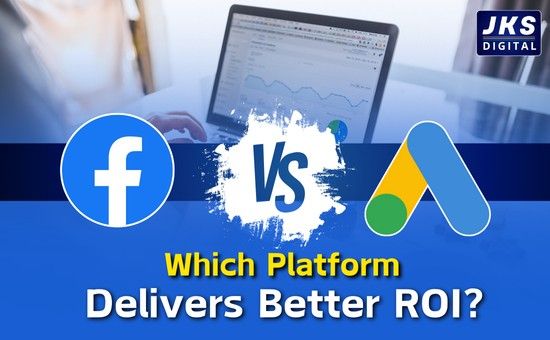Google Ads vs Facebook Ads: In the world of digital advertising, two giants dominate the conversation: Google Ads and Facebook Ads. Both platforms offer powerful ways to reach your audience, but they differ significantly in terms of functionality, targeting, and ROI (Return on Investment). Choosing the right platform for your business depends on various factors like your industry, goals, and budget. Let’s dive into the details to help you make an informed decision.

Understanding the Basics
Google Ads: The King of Intent-Based Advertising
Google Ads, formerly known as Google AdWords, is a pay-per-click (PPC) advertising platform that allows businesses to display ads in Google search results, YouTube, and across Google’s vast Display Network.
- Best For: Capturing intent-driven users who are actively searching for products or services.
- Ad Types: Search Ads, Display Ads, Shopping Ads, Video Ads (YouTube).
- Key Metric: Click-through rate (CTR) and conversion rate from users actively searching for specific keywords.
Facebook Ads: The Champion of Social Engagement
Facebook Ads (including Instagram Ads) focus on demographic and interest-based targeting. These ads appear within the Facebook and Instagram ecosystems, including feeds, stories, and messenger.
- Best For: Building brand awareness, retargeting, and engaging audiences based on their interests.
- Ad Types: Image Ads, Video Ads, Carousel Ads, Stories Ads, and Lead Generation Ads.
- Key Metric: Engagement rate and cost-per-click (CPC) for highly personalized campaigns.
Read Also – Local SEO vs. Global SEO: Which one does your business require?
Key Differences Between Google Ads and Facebook Ads
| Feature | Google Ads | Facebook Ads |
|---|---|---|
| Targeting Method | Keyword-based targeting | Interest and demographic targeting |
| Audience Intent | High (search-driven) | Low to medium (discovery-driven) |
| Ad Formats | Text, display, video | Visual, carousel, video, lead forms |
| Best For | High-conversion campaigns | Brand awareness and retargeting |
| Budget | Flexible, but highly competitive keywords | Lower CPC but may need a larger reach |
ROI: Which Platform Performs Better?
When Google Ads Delivers Better ROI
- For Products or Services with High Search Volume
If people are actively searching for your product (e.g., “best laptops under $1000”), Google Ads will likely deliver better results. You’re tapping into a ready-to-buy audience. - Higher Conversion Rates
With search intent, users clicking on Google Ads often convert faster compared to users who stumble upon an ad on Facebook. - B2B and Local Services
Businesses in sectors like healthcare, real estate, and professional services often see better ROI with Google Ads, especially through location-based targeting.
When Facebook Ads Delivers Better ROI
- For Visual and Emotional Products
If your product or service is visually appealing (like fashion, food, or lifestyle products), Facebook Ads are more effective due to their strong visual storytelling capabilities. - Low-Cost Awareness Campaigns
Facebook Ads are great for creating buzz around new products or services. They offer affordable CPM (Cost Per Thousand Impressions) compared to Google. - Retargeting and Nurturing
Facebook’s retargeting tools allow businesses to reconnect with users who visited their site but didn’t convert. This is particularly useful for e-commerce brands.
Read Also – Content Marketing vs: Paid Ads: Choosing the Best Approach
Factors to Consider When Choosing a Platform
1. Campaign Goals
- Google Ads: Best for generating immediate conversions and sales.
- Facebook Ads: Ideal for building awareness and nurturing leads over time.
2. Budget Allocation
- Google Ads can be expensive for competitive keywords, while Facebook Ads typically offer a lower cost per click (CPC).
3. Audience Type
- Google Ads: Target audiences who know what they want.
- Facebook Ads: Engage audiences who may not be aware of your product but match your customer profile.
4. Data and Analytics
- Both platforms offer robust analytics. However, Google Ads provides keyword performance data, whereas Facebook focuses on audience behavior and engagement metrics.
Read Also – How to Grow Your Facebook Fast: Top 10 Tips and Strategies for 2025
Can You Combine Both?
For many businesses, combining Google Ads and Facebook Ads can be the best strategy. Here’s how you can maximize ROI with a hybrid approach:
- Use Google Ads for Initial Search Traffic
Drive immediate sales or leads from high-intent users. - Retarget with Facebook Ads
Use Facebook Ads to re-engage visitors who didn’t convert and nurture them into loyal customers. - Leverage Cross-Platform Insights
Analyze data from both platforms to understand which ads, audiences, and messages resonate the most.
Conclusion
When it comes to ROI, neither Google Ads nor Facebook Ads is inherently better—they excel in different scenarios. Google Ads is unbeatable for intent-driven searches, while Facebook Ads shines in building brand awareness and engagement. The key is understanding your business goals, target audience, and budget to choose the platform (or combination) that aligns best with your needs.
By evaluating these factors and continuously testing your campaigns, you can find the perfect balance to maximize your ROI.
Stay tuned to JKS Digital to read such latest, engaging and informative posts.

